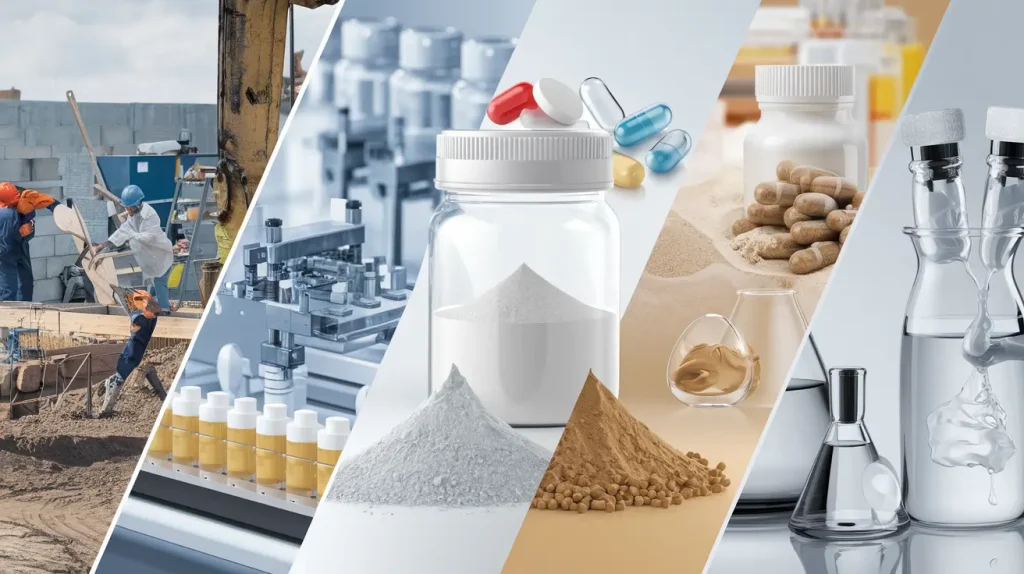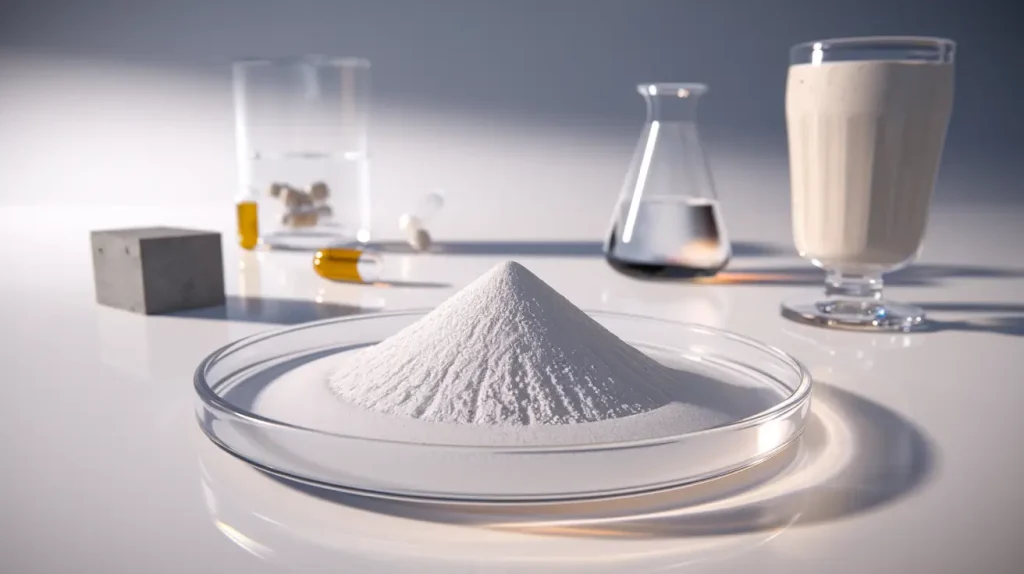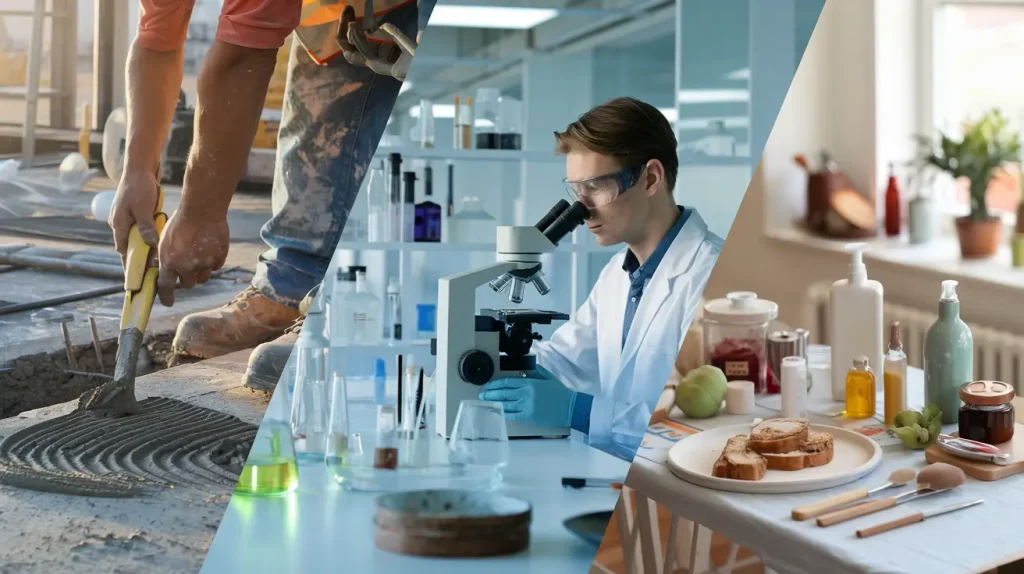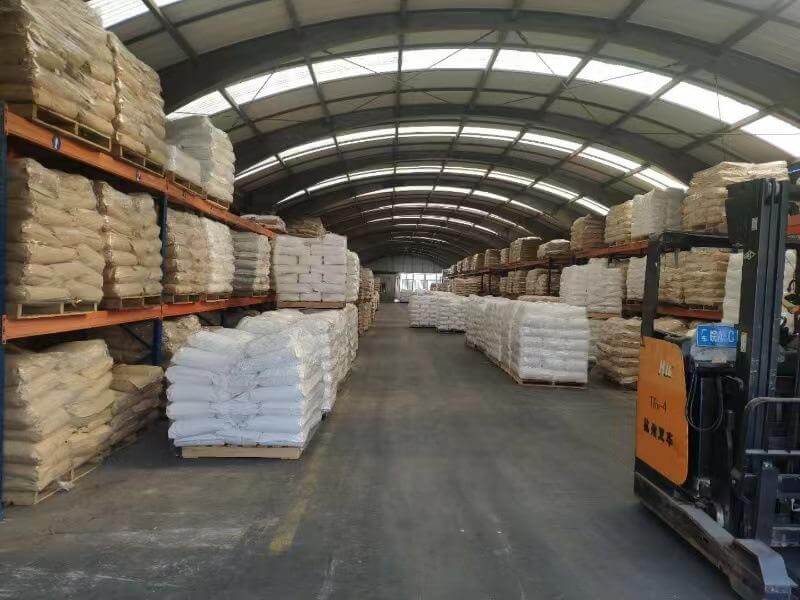مقدمة
Why Selecting the Ideal HPMC Manufacturer is Critical
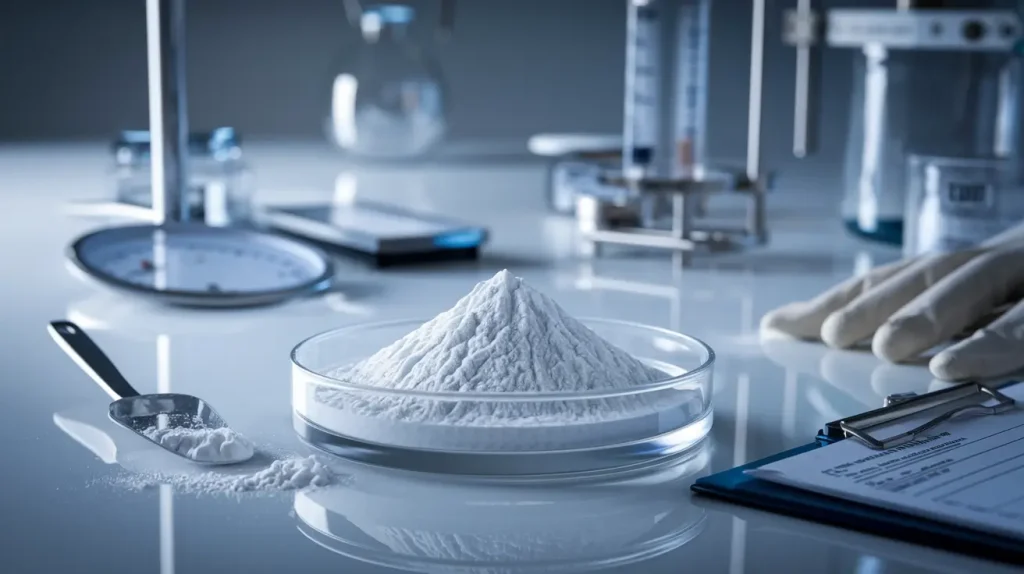
The success of any product begins with its components, and Hydroxypropyl Methylcellulose (HPMC) is no exception. Selecting the right HPMC manufacturer goes beyond sourcing materials; it’s about forging a partnership with a company that prioritizes your unique needs and consistently delivers exceptional quality. An ideal manufacturer ensures your applications in industries such as construction, pharmaceuticals, or food operate flawlessly. With rigorous quality controls, technical proficiency, and a focus on innovation, a dependable HPMC manufacturer becomes a strategic ally in driving your business’s growth and achieving excellence.
The Role of Premium HPMC in Various Industries
HPMC isn’t a one-size-fits-all material; it’s a versatile powerhouse impacting numerous industries. In construction, it enhances water retention and workability, ensuring durable and reliable mortar and cement applications. In pharmaceuticals, it serves as a critical binder and controlled-release agent, essential for drug safety and performance. In the food sector, it provides thickening and stabilizing properties, while in personal care, it improves texture and film formation. High-quality HPMC elevates product performance, boosts customer satisfaction, and strengthens competitive positioning. Partnering with a trusted HPMC manufacturer unlocks the full potential of this multifaceted material, empowering innovation and long-term success.
Understanding HPMC and Its Key Applications
What Is Hydroxypropyl Methylcellulose (HPMC)?
Hydroxypropyl Methylcellulose (HPMC) is a multi-functional polymer derived from cellulose, the natural backbone of plant cell walls. Through precise chemical modification, HPMC emerges as a powerhouse ingredient with remarkable versatility. It is prized for its ability to retain water, form films, and modify viscosity, making it a critical component across industries. From enhancing the texture of foods to ensuring the controlled release of pharmaceuticals, HPMC is a cornerstone of innovation and reliability in product formulation. But what makes it so effective across such diverse applications?
Versatile Applications: From Construction to Pharmaceuticals and Beyond
Few materials can claim the cross-industry versatility of HPMC. In the construction sector, it strengthens cement and mortar by improving water retention and workability, ensuring structures stand the test of time. In pharmaceuticals, HPMC acts as a controlled-release agent and a safe, biocompatible binder essential for creating effective medications. The food and beverage industry leverages HPMC to stabilize and thicken sauces, dairy products, and desserts. Even personal care products and coatings benefit from its film-forming and rheological properties. Clearly, its adaptability knows no bounds—but what specific benefits does it bring to each of these industries?
Core Features of a Reliable HPMC Manufacturer
Commitment to Quality: Meeting Global Standards
A reliable HPMC manufacturer understands that quality is non-negotiable. Delivering consistent, high-performance products requires precision at every step, from sourcing raw materials to final production. Meeting stringent global standards ensures that the HPMC produced maintains optimal viscosity, purity, and functionality. This unwavering commitment to quality translates into better outcomes for your products, whether you’re crafting pharmaceutical tablets or durable construction materials. But how do you identify a manufacturer with such a dedication to excellence?
Certifications and Compliance: Ensuring Industrial Credibility
In today’s competitive markets, certifications are more than just formalities; they are proof of credibility and trust. An HPMC manufacturer with certifications like ISO 9001, GMP, or food-grade approvals showcases a dedication to adhering to industry benchmarks. Compliance with international regulations ensures that the products you receive meet safety and efficacy requirements, providing peace of mind and confidence for your applications. Still, there’s another critical factor to consider—how do they address sustainability?
Sustainable and Eco-Friendly Manufacturing Practices
Sustainability is no longer optional—it’s a responsibility. Leading HPMC manufacturers adopt eco-friendly practices, minimizing waste, reducing energy consumption, and ensuring that their products align with green manufacturing principles. By prioritizing sustainability, these manufacturers not only contribute to environmental preservation but also help businesses align with eco-conscious consumer preferences, enhancing their market appeal. So, what does this mean for your business in practical terms?
Exploring HPMC Product Categories

Construction Grade HPMC: Enhancing Building Materials
In the construction industry, reliability and performance are paramount, and construction grade HPMC delivers both. This specialized product improves water retention, workability, and cohesion in cement-based materials, ensuring durability and ease of application. From plastering mortars to tile adhesives, construction grade HPMC enhances the quality and longevity of building materials, making it an indispensable choice for industry professionals. But how does this compare to its industrial counterparts?
Industrial Grade HPMC: Solutions for Specialized Applications
When it comes to industrial-grade applications, versatility is key. Industrial grade HPMC is tailored for specific demands, such as acting as a binder in ceramics, a stabilizer in paints and coatings, or a rheology modifier in polymer-based products. This adaptability allows manufacturers to fine-tune their formulations, ensuring peak performance in specialized sectors. Yet, in sensitive applications like food and pharmaceuticals, even higher standards are required.
Food and Pharmaceutical Grade HPMC: Purity You Can Trust
For food and pharmaceutical applications, safety and purity are of the utmost importance. Food and pharmaceutical grade HPMC meets rigorous quality standards, offering low heavy metal content and biocompatibility. In pharmaceuticals, it acts as a binder, controlled-release agent, and coating film, while in food products, it serves as a thickener, stabilizer, and emulsifier. These high-purity options ensure that consumer safety and product integrity are never compromised. So, what makes these categories uniquely suited to their respective industries?
The Science Behind High-Quality HPMC
Polymer Chemistry and Advanced Purification Techniques
At the heart of high-quality HPMC lies advanced polymer chemistry. Through precise chemical modifications of cellulose, manufacturers achieve the remarkable properties that make HPMC a multifunctional ingredient. Advanced purification techniques ensure the removal of impurities, resulting in products with unparalleled consistency and safety. This meticulous process is what makes premium HPMC stand out in demanding industries like pharmaceuticals, construction, and food production. But what physical properties truly set HPMC apart?
Thermal Gelation Properties and Viscosity Modifiers
One of HPMC’s standout features is its thermal gelation properties, enabling it to form stable gels when exposed to heat. This attribute is invaluable in applications such as cement and mortar, where controlled viscosity is crucial for ensuring even application and durability. By acting as a viscosity modifier, HPMC enhances product workability, stability, and overall performance in various formulations. Still, another key factor plays a role in its effectiveness—what about particle size?
The Role of Particle Size Distribution in Performance
Particle size distribution might seem like a minor detail, but it significantly impacts HPMC’s functionality. Consistent particle size ensures even dispersion, faster dissolution, and predictable behavior in end-use applications. Whether it’s a construction material or a pharmaceutical tablet, precise particle size distribution ensures reliability and efficiency, making it a critical factor in delivering high-quality HPMC solutions. So, how do these scientific principles translate into real-world results?
Customization and Flexibility: Tailored HPMC Solutions
Why Substitution Degree Matters: Methoxyl and Hydroxypropyl Levels
The substitution degree of HPMC—measured by its methoxyl and hydroxypropyl levels—plays a pivotal role in determining its properties and performance. These substitution levels impact key factors such as solubility, viscosity, and thermal gelation. A reliable manufacturer offers precise control over these parameters, enabling the customization of HPMC to meet diverse requirements, whether for high-viscosity construction materials or fast-dissolving pharmaceutical applications. But how does this customization benefit industries facing unique challenges?
Adapting Products for Specific Industry Needs
Every industry has unique challenges, and a one-size-fits-all solution simply won’t suffice. Tailored HPMC solutions allow businesses to optimize formulations for specific uses, such as enhancing water retention in cement mortars or creating biocompatible binders for drug delivery systems. This flexibility not only boosts product performance but also empowers businesses to innovate and stay competitive in their respective markets. So, what should you look for in a manufacturer to ensure these tailored solutions meet your exact specifications?
Challenges in the Industry and How a Reliable Manufacturer Overcomes Them
Addressing Supply Chain and Logistics Issues
In a globalized economy, supply chain disruptions can halt operations and erode trust. Reliable HPMC manufacturers mitigate these risks through robust logistics networks, streamlined communication, and contingency planning. With the ability to provide timely deliveries and adapt to demand fluctuations, these manufacturers ensure uninterrupted supply, even during volatile market conditions. But maintaining a dependable supply chain is just one piece of the puzzle—how do they uphold stringent safety standards?
Ensuring Low Heavy Metal Content for Safety and Compliance
Industries like food and pharmaceuticals demand the highest safety standards, and heavy metal contamination is a critical concern. Trustworthy manufacturers implement advanced purification techniques and rigorous quality control processes to produce HPMC with low heavy metal content. This commitment not only meets regulatory requirements but also protects end-users and reinforces product integrity. Still, in today’s world, environmental responsibility is equally critical—how are manufacturers addressing sustainability challenges?
Tackling Environmental and Sustainability Challenges
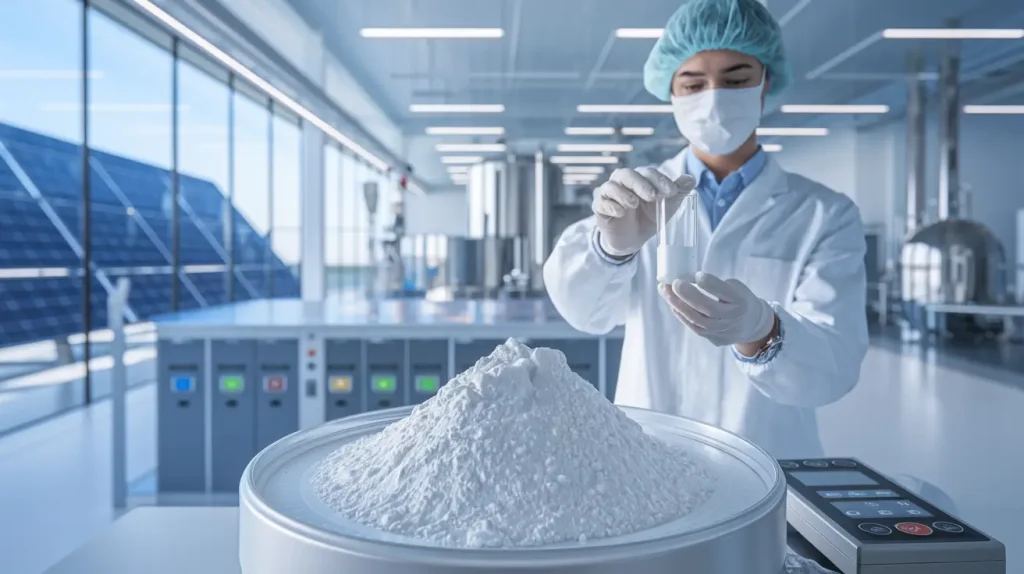
Sustainability is no longer optional—it’s an imperative. The chemical industry faces increasing pressure to adopt eco-friendly practices, and HPMC manufacturers are stepping up. By utilizing green manufacturing methods, minimizing waste, and optimizing energy use, they produce environmentally responsible products. This proactive approach not only supports global sustainability goals but also helps their clients meet the growing demand for eco-conscious solutions. So, how can these strategies translate into a competitive advantage for your business?
Key Benefits of Partnering with a Trusted HPMC Manufacturer
Product Quality Assurance and Technical Support
When partnering with a trusted HPMC manufacturer, you gain more than just a supplier—you secure a partner committed to excellence. Reliable manufacturers deliver consistent product quality through rigorous testing and advanced production processes, ensuring that every batch meets your specifications. Beyond the product itself, their technical support teams provide invaluable guidance, troubleshooting, and customization advice to help you optimize your applications and achieve superior results. But how does this partnership impact your bottom line?
Competitive Pricing Strategies for B2B Customers
Cost-efficiency is a cornerstone of business success, and a dependable HPMC manufacturer understands the importance of balancing quality with affordability. Through scalable production capabilities and efficient operations, they offer competitive pricing tailored to B2B clients. This enables businesses to reduce costs without compromising on performance, fostering long-term profitability in competitive markets. Still, none of this would matter without reliable delivery systems—how do they handle logistics?
Efficient Logistics and Global Export Expertise
In today’s fast-paced industries, timely deliveries and seamless logistics are essential. Leading HPMC manufacturers excel in supply chain management, ensuring prompt and reliable shipments. With expertise in navigating global trade regulations and export procedures, they guarantee hassle-free cross-border transactions, helping businesses maintain smooth operations and meet tight project deadlines. So, what should you prioritize when choosing your HPMC manufacturing partner?
Real-World Applications and Success Stories
Cement and Mortar Industry: Improving Water Retention and Workability
The construction industry relies heavily on HPMC to achieve better performance in cement and mortar formulations. By enhancing water retention, HPMC prevents premature drying and cracking, ensuring stronger bonds and smoother application. In projects ranging from residential buildings to massive infrastructure, the use of HPMC has delivered improved durability and efficiency, becoming a cornerstone for professionals in the field. But what makes HPMC equally indispensable in sensitive sectors like food and pharmaceuticals?
Food Additives and Pharmaceutical Excipients: Ensuring Safety and Efficacy
In the food and pharmaceutical sectors, safety and functionality are paramount. HPMC’s role as a thickener and stabilizer makes it essential for creating creamy textures and prolonging shelf life in food products. In pharmaceuticals, it is indispensable as an excipient for controlled-release medications and tablet coatings, ensuring precision and compliance with strict safety standards. Numerous companies have leveraged high-quality HPMC to produce groundbreaking solutions in these sensitive industries. Yet, its transformative impact doesn’t end here—how is HPMC shaping innovation in other markets?
Innovative Uses in Adhesives, Coatings, and Polymer Modifiers
HPMC’s versatility extends to adhesives, coatings, and polymer modifiers, where its rheological properties and film-forming capabilities are transformative. Manufacturers have used it to develop eco-friendly, high-strength adhesives, durable surface coatings, and polymer modifiers that enhance product stability and performance. These innovations showcase HPMC’s potential to drive breakthroughs in niche markets, solidifying its reputation as a multifunctional material with endless possibilities. So, how can your business harness these proven applications to achieve success?
How to Choose the Best HPMC Manufacturer for Your Business
Evaluating Industrial Certifications and Product Specifications
When choosing an HPMC manufacturer, the first step is to ensure they meet global quality standards and hold the necessary certifications. Look for accreditations like ISO, GMP, or food-grade approvals that reflect their adherence to safety, quality, and regulatory compliance. Additionally, examining product specifications—such as viscosity ranges, particle size distribution, and substitution levels—helps you confirm that their offerings align with your application needs. But certifications and specs are just the starting point—what about their flexibility and customer support?
Questions to Ask About Customization, Support, and Delivery
A great manufacturer doesn’t just supply products; they offer tailored solutions. Ask about their ability to customize HPMC to match your specific requirements, whether it’s adjusting methoxyl levels or optimizing viscosity. Don’t forget to inquire about their technical support, delivery timelines, and responsiveness to ensure smooth communication and reliable service. These factors are critical to fostering a successful partnership. Still, choosing a manufacturer isn’t just about the present—how can you ensure long-term success?
Tips for Long-Term Success with a Reliable Supplier
Building a long-term relationship with an HPMC manufacturer requires more than a transactional approach. Seek a supplier who prioritizes innovation and scalability to grow with your business. Evaluate their track record for consistent quality, ethical practices, and sustainable manufacturing. A reliable partner not only meets your immediate needs but also supports your future success through adaptability and shared goals. Are you ready to identify the manufacturer who checks all these boxes?
خاتمة
Summing Up the Importance of a Trusted HPMC Partner
Choosing the right HPMC manufacturer is more than a procurement decision—it’s a strategic partnership that defines the quality and success of your products. From ensuring consistent performance and meeting regulatory standards to providing tailored solutions and reliable support, a trusted manufacturer plays a pivotal role in driving business growth and innovation. Prioritizing quality and collaboration ensures that your formulations excel in competitive markets, no matter the industry. But how can you take the next step toward securing this vital partnership?
Call to Action: Finding Your Reliable HPMC Manufacturer Today
Now is the time to secure a partnership that empowers your business. Collaborate with a reliable HPMC manufacturer who aligns with your values and delivers excellence at every step. Morton, as a global leader in HPMC production, combines cutting-edge manufacturing processes with unparalleled customer service. With over five advanced production lines and a presence in Europe, North America, Asia, and beyond, Morton is your partner for high-quality, customizable solutions that meet your exact needs. Contact us today to explore how we can help you achieve superior results in your industry.
FAQs: Key Considerations When Choosing an HPMC Manufacturer
1. What is HPMC, and why is it essential in manufacturing?
Hydroxypropyl Methylcellulose (HPMC) is a versatile polymer used across industries like construction, food, and pharmaceuticals. Its ability to retain water, thicken, and stabilize products makes it crucial for ensuring consistent quality and performance.
2. What should I consider when evaluating an HPMC manufacturer?
Key factors include certifications such as ISO or GMP, a strong track record of product consistency, advanced manufacturing processes, and customer reviews. Look for manufacturers that provide technical support and offer tailored solutions.
3. Why is particle size distribution important in HPMC products?
Particle size distribution influences the solubility, dispersion, and overall effectiveness of HPMC. Consistency in particle size ensures optimal performance, particularly in construction and pharmaceutical applications.
4. How does HPMC enhance the cement and mortar industry?
HPMC improves water retention, workability, and adhesion in cement and mortar, helping to prevent cracks and enhance durability. Its properties make it an indispensable ingredient for both small- and large-scale construction projects.
5. What customization options should an HPMC manufacturer offer?
Leading manufacturers provide options such as tailored methoxyl and hydroxypropyl content, varying viscosity levels, and specific product grades to cater to the needs of industries like construction, food, and pharmaceuticals.
6. Is HPMC safe for use in food and pharmaceuticals?
Yes, food and pharmaceutical-grade HPMC undergo strict quality control to comply with global safety standards. Its biocompatibility and low heavy metal content make it safe for these applications.
7. What are the environmental advantages of working with a sustainable HPMC manufacturer?
Eco-friendly manufacturers adopt green practices like waste reduction, energy optimization, and environmentally conscious production methods. Partnering with such companies supports sustainability goals and aligns with consumer demands.
8. How can a reliable HPMC manufacturer help reduce costs?
A dependable manufacturer ensures consistent quality, minimizing product defects and rework. Their competitive pricing, efficient logistics, and expert technical support can streamline your operations and enhance cost-efficiency.
9. Which industries benefit the most from using HPMC?
HPMC is widely used in industries such as construction, pharmaceuticals, food, adhesives, coatings, and personal care. Its adaptability and performance make it a preferred choice for diverse applications.
10. How can I establish a long-term partnership with an HPMC manufacturer?
Look for manufacturers that emphasize innovation, scalability, and consistent quality. Foster collaboration through open communication, regular feedback, and alignment on shared objectives to build a successful, long-term relationship.

